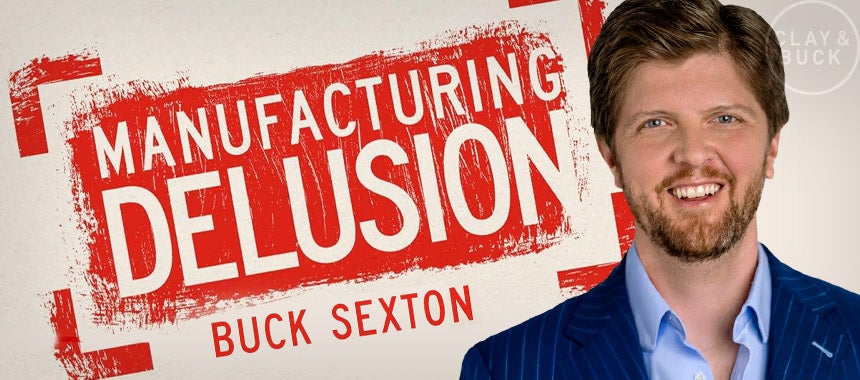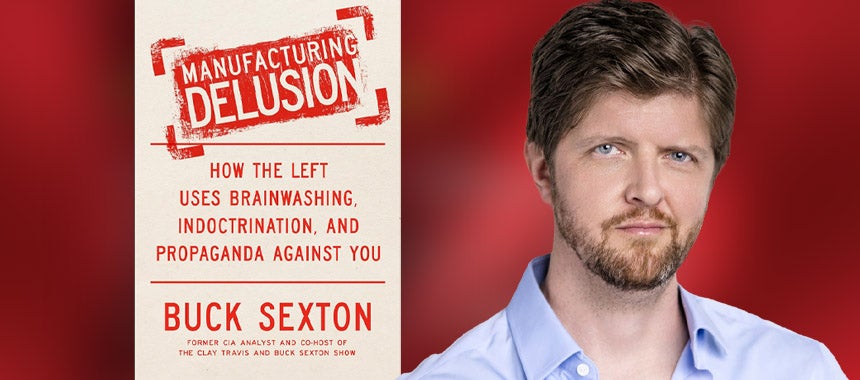Noah Rothman Pushes Back on the Left’s War on Fun
22 Jul 2022
BUCK: Noah Rothman with us. He is over at Commentary Magazine. He’s got a new book out, I like the title, “The Rise of the New Puritans: Fighting Back Against Progressives’ War on Fun.” Noah, thanks for being with us.
ROTHMAN: My pleasure, thanks for having me.
 BUCK: Libs hate fun these days. That feels like something that we talk about on the show regularly. They don’t like comedy. They don’t like people to have too much of a good time, it seems. What does this have to do with puritanism? And bring me into the crux of the argument of your latest opus.
BUCK: Libs hate fun these days. That feels like something that we talk about on the show regularly. They don’t like comedy. They don’t like people to have too much of a good time, it seems. What does this have to do with puritanism? And bring me into the crux of the argument of your latest opus.
ROTHMAN: Yes, so basically I think you’re probably familiar with the premise, is that essentially we’re treated to lots of moral crusades now from the left, which is very jarring if you grew up in this country over the last 30, 40 years. Normally, for our experience, the tendency to see in seemingly innocent cultural fair the stuff that corrupts you and degrades society was something that was native to the right. It was a less-than-emphasized self-fulfillment, self-gratification, even hedonism by contrast.
Today, as you say, we’re treated to moral crusades, where entertainment products have to have a grander social value than just being entertainment, where comedy and comedians emphasize the pain that somebody had to experience, so you could have something as trite and frivolous as a punch line, sports coverage that shoehorns digressions about the lamentable state of race relations into their coverage. And when fans object, as they often do, they’re admonished for clinging to escapism over their duty as a moral, responsible citizen to dwell on the world’s horrors at all times.
As the committee has alleged, America’s armed forces responded to directions from actors outside the chain of command. https://t.co/oWIJS4JPfi
— Noah Rothman (@NoahCRothman) July 22, 2022
Why did this happen? That’s the question I ask in this book, and I’ve come to this idea of a moral framework that is informing this, which is derived from the origins of progressivism as progressives identify more as progressivism than liberalism. They’ve adopted its habits of mind. Among them puritanical traits like utopianism, about fear of banalities and an anxiety towards idleness that which isn’t productive contributing to the project, the project of our time being the advancement of the progressive project, the mission. It’s worse than worthless. It detracts from that effort.
So, this book is designed to help you identify, sort of solve this puzzle that we’ve all been staring at for the last five years unable to discern. But it is also kind of irreverent. It’s supposed to give you a permission structure to laugh at these people because, while it’s a small group, they punch above their weight and they’re very intimidating. But they don’t have to be. A lot of what they do is objectively hilarious, and this book is designed to allow you an opportunity to laugh at that which is objectively funny.
CLAY: Okay, this is perfect, Noah and thanks for coming on the show. If you remember the first protest that they had against Dave Chappelle and Netflix, another comedian showed up there and he just made a placard and it just said “I like jokes. Jokes are fun.” And he just kind of walked around saying that. And the woke community ripped down his banner and basically kind of attacked the idea that he could walk around and say jokes are fun. So here’s the question that I think a lot of our listeners have out there. You’re right in the diagnosis that you have given and how crazy this has become. When can we get back to comedians just being able to tell whatever joke they want to tell, and how do we get there?
ROTHMAN: I mean, there are real commercial pressures at work breaking down this censorius moral structure that’s being imposed on comedy. I see parallels with how the moral strictures around comstockery, the 19th century efforts to police public morality, broke down based on commercial pressures. I sort of identify that in the story “Banned in Boston”. That phrase used to delineate titillating literary experiences that had the power to corrupt you, corrupt society with a warning against pure literature and it was very successful well into the 20th century. When it began to break down it broke down because “Banned in Boston” stopped being a warning against impure literature and became a powerful advertisement for it.
BUCK: Trigger warning: You’ll have too much fun if you read this.
ROTHMAN: Publishers tried to have their books banned in Boston to increase sales around the country. If there’s a modern equivalent, I think it’s banned on Facebook, banned on Amazon, where conservative books, and they’re usually conservative books, tend to be censored by 20-somethings who don’t know what they’re doing. And they have profound reach. They become best sellers, well beyond, disproportionate to the PR campaigns around that book because it becomes an advertisement for them.
You’re always going to have iconoclasts and taboo breakers. That’s the cost of living in a free society. And it’s a low price to pay. And that’s sort of an advertisement for experiences that you just have to have yourself, will contribute to the breaking down of this phenomenon. There’s probably going to be a lot of pain along the way. But the bottom line is just something that a company that has a fiduciary responsibility to its investors can’t ignore, like, Netflix, like Spotify. You’re beginning to see the cracks in this facade.
BUCK: Speaking to Noah Rothman. He’s an editor over at Commentary Magazine. His book is “The Rise of the New Puritans: Fighting Back Against Progressives’ War on Fun.” And that’s definitely a thing they’re fighting, the war on fun.
 Noah, switching to a very different kind of fight, a real conflict, a war that’s underway right now, I know you have a degree in Russian studies and political science. You focused on the former Soviet Union for your graduate degree and are following the situation in Ukraine closely. I’m seeing today we’re considering sending over the A10 Warthog platform, fixed-wing platform to help the Ukrainians against Russian armor. Where do you think all this is going, and how do you think the Biden administration has handled this?
Noah, switching to a very different kind of fight, a real conflict, a war that’s underway right now, I know you have a degree in Russian studies and political science. You focused on the former Soviet Union for your graduate degree and are following the situation in Ukraine closely. I’m seeing today we’re considering sending over the A10 Warthog platform, fixed-wing platform to help the Ukrainians against Russian armor. Where do you think all this is going, and how do you think the Biden administration has handled this?
ROTHMAN: I have not seen that report. That would be something of a game-changer, right? Remember, very early in the conflict, it was a stalled convey on the way into Kyiv. And it was miles long. And every military analyst said, well, they only had an A10 that could knock this convoy out; this war would be over in a minute. That’s very interesting.
The west has sort of hamstrung itself because we’ve had conversations among ourselves over what’s escalatory, what’s not escalatory, what Ukraine is allowed to do with the platforms that we give them; if they’re not allowed to train, fight, track fire coming in from Russia and then return fire based on whether there’s a track. We’re tying one hand behind their back. And the Russians are paying attention. We set the pace of what we decide as escalatory and they subsequently adopt what we determine as escalatory, only to reverse ourselves later on. Fixed-wing aircraft, drones. As we said, multiple launch rocket systems. We should probably stop doing that.
Right now it’s a game of inches in the Donbas, but we’re not paying as much attention to the counteroffensives that are going around, Ukrainian-led counteroffensives, and they’re being relatively successful. Right now you can only foresee stalemates. But there’s movements. And it has a lot to do with these weapons platforms that we’re giving Ukraine, to great effect. We should probably — if our objective is for Ukraine to win this war — and it is — then we should endorse that objective and stop behaving as though we sort of want victory but not a total victory. Either we want Russia to lose or we don’t.
CLAY: Yep. It is kind of wild to think about where we are headed here. Are you optimistic? You just wrote this entire book, looking at the direction that our censorius culture has gone. You talked about maybe the political pressure, the “Banned in Boston” angle, and some of that may be starting to filter into Netflix. We certainly saw the biggest and most successful hit of the summer across many different age groups was Maverick Top Gu or “Top Gun” Maverick,” I should say which had almost no woke-related commentary inside of it. Are you optimistic that we’re coming through the tail end of this or do you think we have a bunch more years left?
 ROTHMAN: Oh, we have years left. But I am optimistic that we’ve reached peak woke. That’s a great example of this. Not because it’s anti, per se. It just isn’t pro. It didn’t advance any of the themes of — it didn’t have this plodding didactic narrative. It’s very tyrannical to have the modern contemporary morals forced on you and it can’t be subtle because you can’t be trusted with subtle.
ROTHMAN: Oh, we have years left. But I am optimistic that we’ve reached peak woke. That’s a great example of this. Not because it’s anti, per se. It just isn’t pro. It didn’t advance any of the themes of — it didn’t have this plodding didactic narrative. It’s very tyrannical to have the modern contemporary morals forced on you and it can’t be subtle because you can’t be trusted with subtle.
BUCK: “Maverick” did not come out as a pansexual member of the trans community. So that did not happen.
ROTHMAN: Who knows. I think we’re coming out of the end of that. I’m optimistic about that. And I’m optimistic to a degree about the war in Ukraine. I don’t know how that ends. And it may not end in a way that the West would see as satisfactory. But I don’t think that Russia calculated properly the degree to which NATO would respond in a sustained material way to its aggression. I was surprised by the response and the cohesive response because the Russian strategy has always been to break NATO alliance. And that would be to test the frontier, to force terrorists in London and Berlin to contemplate a real war with Moscow for (indiscernible). And the assumption on Moscow’s part was that NATO would blink.
I don’t think they think that anymore. I certainly don’t think that anymore. So there are certainly some benefits that come out of this in the form of a reinvigorated, cohesive Atlantic alliance, which will certainly stay Russia’s hand in the future. That also probably means our adversaries have misjudged us and we probably misjudged them so there’s a lot of misjudgment coming.
BUCK: Check out Noah Rothman’s book, “The Rise of the New Puritans: Fighting Back Against Progressives’ War on Fun”. We’re all fighting the war on fun because we want to have fun here. Thanks, Noah. Appreciate it.
Recent Stories

What Is Menticide — And Why America Is Close to It
It's a fascinating aspect to Buck's new book, Manufacturing Delusion.

Gavin Newsom Says Something Stupid… and Gets a Free Pass (Because He’s a Democrat)
Was it racist? Or just typical Newsom BS?

Manufacturing Delusion Is On Sale Now!
Buck's book is one of the most popular on the charts. Get it now.

Soren Aldaco: A Detransitioner's Story
One of our most powerful interviews in recent memory. Don't miss it.






